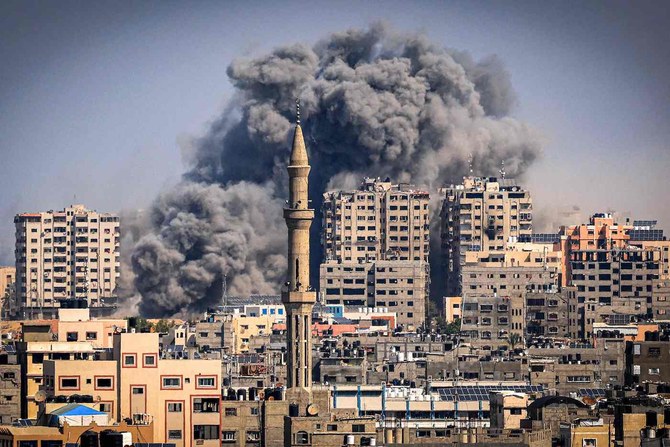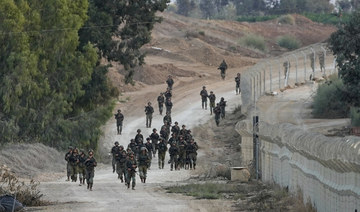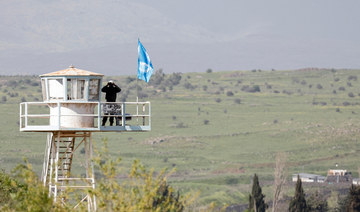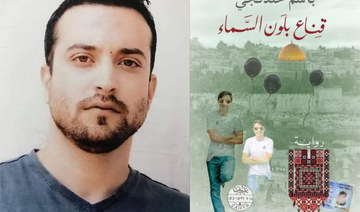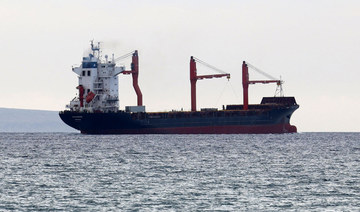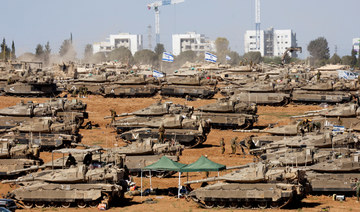JERUSALEM/GAZA/TEL AVIV: Israel said on Thursday there would be no pause in its siege of the Gaza Strip for aid or evacuations until all its hostages were freed, as Washington urged it to protect civilians and the Red Cross warned of a humanitarian catastrophe in the enclave.
US Secretary of State Antony Blinken, arriving in Tel Aviv on a trip to show solidarity, told Prime Minister Benjamin Netanyahu that America would always be by Israel’s side and give security assistance, but he urged Israel to show restraint “even when it’s difficult.”
Israel has vowed to annihilate the Hamas movement that rules the Gaza Strip, in retribution for the deadliest attack on civilians in Israeli history, when hundreds of gunmen crossed the barrier and rampaged through towns on Saturday.
Opinion
This section contains relevant reference points, placed in (Opinion field)
The head of the Israeli military, Lt. Gen. Herzi Halevi, said lessons would be drawn from the security failures around Gaza that enabled the attack.
“The IDF is responsible for defending the country and its citizens, and Saturday morning, in the area around Gaza, we did not live up to it,” he said. “We will learn, investigate, but now is the time for war.”

Palestinian officials reported over 1,300 people killed in Israel’s uninterrupted campaign of air and artillery strikes, while the UN said more than 338,000 people have been displaced. (AFP)
Public broadcaster Kan said the Israeli death toll had risen to more than 1,300. Most were civilians gunned down in their homes, on the streets or at a dance party. Scores of Israeli and foreign hostages were taken back to Gaza; Israel says it has identified 97 of them.
Israel has responded so far by putting Gaza, home to 2.3 million people, under total siege and launching by far the most powerful bombing campaign in the 75-year-old history of the Israeli-Palestinian conflict, destroying whole neighborhoods. Gaza authorities said more than 1,400 Palestinians have been killed and more than 6,000 have been wounded.
The International Committee of the Red Cross said fuel powering emergency generators at hospitals in Gaza could run out within hours.
“Without electricity, hospitals risk turning into morgues,” ICRC regional director Fabrizio Carboni said. “The human misery caused by this escalation is abhorrent, and I implore the sides to reduce the suffering of civilians.”
Israeli Energy Minister Israel Katz said there would be no exceptions to the siege without freedom for Israeli hostages.
“No electrical switch will be lifted, no water hydrant will be opened and no fuel truck will enter until the Israeli hostages are returned home. Humanitarian for humanitarian. And nobody should preach us morals,” Katz posted on social media platform X.
Egypt, which has a single border crossing with Gaza, said it was trying to allow in aid there.

Palestinians evacuate the area following an Israeli airstrike on the Sousi mosque in Gaza City. (AFP)
In the biggest sign yet of the conflict potentially spilling across borders, Syria said Israeli air strikes had hit the airports in Damascus and Aleppo, putting both out of service. The Israeli military said it does not comment on such reports. Syria is a close ally of Iran, which sponsors Hamas and has celebrated the attacks while denying a direct role.
Standing beside Netanyahu, Blinken said: “You may be strong enough on your own to defend yourself. But as long as America exists, you will never ever have to. We will always be there by your side.”
Netanyahu said: “Thank you, America, for standing with Israel, today, tomorrow and always.”
Blinken also offered an emotional, personal aside, recounting how his own grandfather had fled pogroms in Russia and his stepfather survived Nazi concentration camps.
“I understand on a personal level the harrowing echoes that Hamas’ massacres carry for Israeli Jews, indeed, for Jews everywhere,” he said.
“We democracies distinguish ourselves from terrorists by striving for a different standard, even when it’s difficult. That’s why it’s so important to take every possible precaution to avoid harming civilians.”
Blinken will visit Jordan on Friday to meet King Abdullah and Mahmoud Abbas, head of the Palestinian Authority that operates limited self-rule in the Israeli-occupied West Bank.
Abbas, whose Fatah faction is a longstanding foe of Hamas, condemned violence against civilians on both sides on Thursday.
“We reject the practices of killing civilians or abusing them on both sides because they contravene morals, religion and international law,” the official Palestinian news agency Wafa quoted Abbas as saying.
Scores of Israelis gathered in Jerusalem’s Mount Herzl military cemetery on Thursday to bury their dead.
“When you didn’t take my call, I knew you were fighting with all your power. When I realized you were missing, I could not imagine this is how it would end,” one mourner said.
In Gaza’s main southern city Khan Younis, where cemeteries were already full, dead were being buried in empty lots, like the Samour family, killed on Wednesday night in a strike that hit their house.
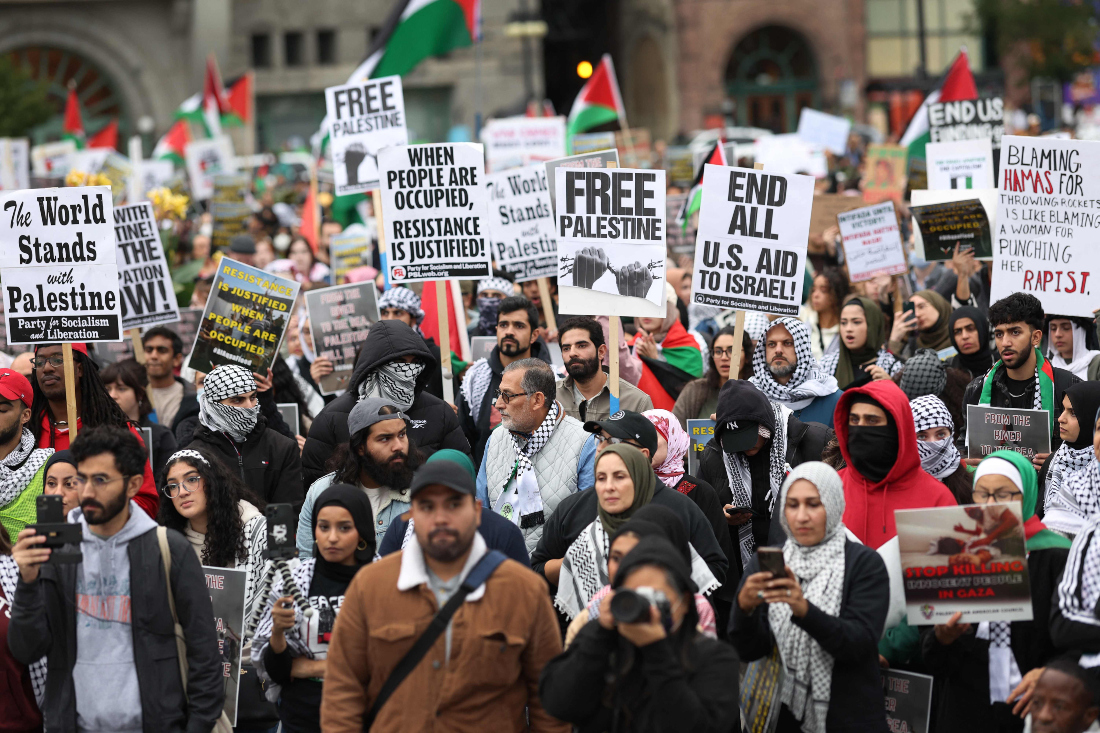
Demonstrators rally and march through downtown to show support for the Palestinian people in Chicago, Illinois. (AFP)
Relatives and friends found eight bodies at the morgue, with 10 more still believed to lie under the rubble. The bodies were driven from the hospital in a truck covered with flowery blankets, and lined up in white shrouds at a lot down the street from their destroyed home. Hundreds of men prayed nearby.
At the nearby hospital, a woman tried to calm a weeping girl whose house had been hit. The girl kept screaming “my mother, I want my mother.” The woman took the girl in her arms.
In Gaza’s Al-Shati refugee camp, residents were sifting through rubble with their bare hands looking for survivors and bodies. Rescue workers say they lack fuel and equipment to dig.
While Washington has strongly backed Israel, Blinken’s plan to meet Abbas shows it is still mindful of Palestinian grievances, strongly felt by Arab allies.
Gazans, mainly descendants of refugees who fled or were expelled from homes in Israel at its founding in 1948, have suffered economic collapse and repeated Israeli bombardment under a blockade since Hamas seized power there 16 years ago.
Palestinian anger has mounted in recent months, with Israel carrying out the deadliest crackdown for years in the West Bank and its right-wing government talking of seizing more land. A peace process meant to create a Palestinian state collapsed a decade ago, which Palestinian leaders say left the population with no hope, strengthening extremists.




